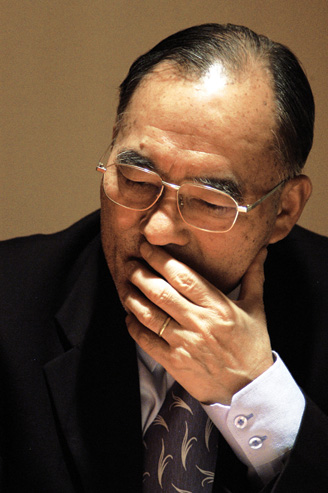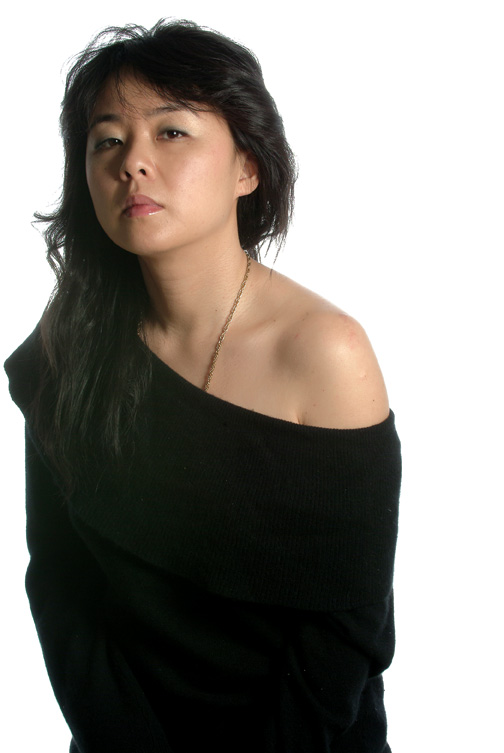By Janet Kwon
Photographs by John Pai
With his wispy black hair and slight build, the Rev. Phillip Jun Buck, 68, rested his hands momentarily on the frosty fiberglass pulpit, slouching his shoulders and gazing at the congregation through his square, gold-rimmed glasses. Buck was a guest speaker at the Horizon Korean Church in downtown Seattle, and the congregants sat in rapt attention.
“Jesus is alive! Jesus is alive!” he repeated in Korean, pumping his fists in the air and bringing them down in unison with a resounding bang. A wave of “Amens” cascaded through the crowd. Buck had much to be thankful for — namely, that he had been held for 15 months in a prison in Yanji, China, and survived.
On May 9, 2005, Buck and a small group of three other volunteers were shepherding 14 North Korean refugees across the Chinese border and into a third country (which Buck declines to name so as to protect all parties involved) to seek asylum at the South Korean embassy. Only four, however, were able to find safe passage, while the rest of the group, including Buck, was arrested. Under Chinese criminal code 318, Buck was charged with illegally transporting North Korean refugees out of China without visas. After 15 months in prison, he was released and sentenced to deportation and a fine of $5,000, though he spent upwards of $30,000 in legal fees.
After braving 15 months of captivity, a gaunt and exhausted Buck returned to Washington last August to waves of balloons and flowers from friends, relatives and supporters. Buck told reporters at Seattle-Tacoma International Airport that he felt like he was in a “dream state.”
But just four months after his release, Buck is thinking of returning — a move that his family is adamantly against.
“If he tries to go back, we’re going to tie him up!” said Grace, the youngest of Buck’s three children. “I think it’s about time for my dad to retire, he will be 70 soon. I want him to just relax at home, to go fishing and play with his grandchildren. But I know him. He will work as a missionary until the day he dies, and I cannot stop him from doing so.”
Buck’s tenacity and devotion to his ministry may have gotten him jailed, but those same traits have earned him the reputation of a modern-day hero.
“I think that people like Phillip Buck will go down in history as the Harriet Tubmans and Raoul Wallenbergs of today, and I’m very honored to know him,” said Suzanne Sholte, president of Defense Forum Foundation, a Washington, D.C.-based nonprofit educational foundation that sponsors programson foreign affairs, defense and human rights issues.
“It’s people like him that are the real heroes and really put themselves at risk. Sadly, the Chinese government calls him a trafficker. We call him a hero and a humanitarian rescuer.”
In addition to the Defense Forum Foundation, the Wholistic Peace Institute and Helping Hands Korea are other organizations that took up Buck’s cause and fought for his release. They participated in letter-writing campaigns, protests and congressional testimonies and pressed for Buck’s freedom.
“Phillip’s desire, if he were to be released from prison, was to go right back to work helping the North Korean refugees and to continue to collaborate with Helping Hands in their rescue,” wrote Tim Peters, founder of Helping Hands Korea, in an e-mail. “I think [this] illustrates the character and determination of this amazing man.”
According to a representative from the U.S. Department of State, U.S. embassy officials regularly visited with Buck while he was in prison and repeatedly raised his case to the Chinese government. Buck recalled nine visits from different members of the U.S. Consulate during his imprisonment. “It’s out of my experience that [I realized] this country really cares for its citizens,” said Buck through his daughter and interpreter, Grace.
The minister said he kept a positive outlook even when he was imprisoned. In jail, he endured many nights of sleep deprivation, intense interrogation and malnutrition.
Though he was not physically abused by his detainees under the protection from the American consulate, his body still suffered. Through the span of his 15-month captivity, he lived on rice porridge alone for sustenance, because he could not ingest anything else due to his chronic ulcer. However, he saw his captivity as a chance to evangelize and share the Gospel with inmates and prison guards. He even characterizes his imprisonment as a blessing, since it increased awareness of the North Korean plight and also helped broaden his ministry, enabling him to connect with various parties in helping refugees.
***
Phillip Buck was born on Jan. 6, 1938, in North Korea. When the Korean War broke out in 1950, a 12-year-old Buck and three of his nine siblings fled to the South. Though the rest of his family, including his parents, tried to leave shortly thereafter, they were caught before crossing the border, so Buck spent the remainder of his childhood in a South Korean orphanage. He recalls pleasant memories of his youth, but admits that his childhood was certainly not without hardship, although he’d prefer not to go into detail.
“There were a lot of sad things that happened there, so I strongly believe in helping people who are sad and people who are in need,” he said.
At 14, Buck started to attend a local church, but never entertained the idea of becoming a missionary or a pastor. Instead, he had his mind set on attending military school and becoming a general in the army. He also had aspirations of running a ranch full of animals.
As a teenager, Buck says that his faith was weak. He constantly asked himself, “Does God really exist?” Heaven was merely an ethereal concept brought up in sermons. He stopped attending church. “But once I quit going, fear grabbed me. … I had fear in my heart whenever I heard the church bells ring,” he said with a laugh. “I thought, what if I go to hell since I’m not going to church?”
Eventually, he sought advice from an elder at his church, who told Buck to attend a prayer meeting at Mount Yongmun in North Gyeongsang Province. She told him that prayer would lead him to the Holy Spirit. With no patience for the bus, he walked almost 25 miles to get to the prayer site.
“About 2,000 people were there. They were screaming and praying and crying. They were screaming their prayers so loudly that I wondered, ‘Is God deaf or something?’”
Buck felt embarrassed for those who were showing their emotions with such abandon and decided to leave. But he found himself returning a number of times. One evening, he thought he would try praying like everyone else. He mimicked the others, closing his eyes and folding his hands.
“At that moment, this huge fire from heaven just poured down on my back. I just went flat onto the ground and began to scream and cry. Tears just came out of my eyes — just dropping and dropping,” he said.
“It was because God was watching me all along. Me, who was not a believer and a mean man — a man who said that God did not exist. I was really scared and cried out, ‘God! God! Please forgive me!’ I began to cry and repented my disbelief and told him I would believe him from now on. But still, God did not withdraw his fire. It felt like the fire would burn me alive. So I kept repenting and begging for forgiveness.
“And then, God came into my heart. Now, I believed. God exists. At that moment, God let me see the vision of heaven. It was so magnificent that I stood up and started to dance and worship. I became a shepherd who leads people.”
After obtaining his bachelor’s and master’s degrees in theology, Buck was ordained as a minister in 1973 by the Korean Assemblies of God. After working in Korea for a decade, Buck moved to the United States to pastor a church in Miami. Since then, he has led churches in Alaska, Nebraska and Washington, where he and most of his immediate family now reside.
Throughout the course of his ministry, Buck always held a desire to help the people of his native homeland. When Buck went back to North Korea in the late ‘90s, he was hit with tragic news. He discovered his parents had already passed on, and his siblings were living in dire conditions.
“My heart broke for them. There was nothing — no rice, no corn. The environment and the society itself remained similar to 1950 or worse. … I felt like it was a sin for me to live so well in the U.S., when my siblings were in such tragic situations in North Korea,” he said.
According to Human Rights Watch, a nongovernmental organization that seeks to protect human rights globally, the famine of the late 1990s killed approximately 1 million people, which amounts to about 5 percent of North Korea’s population. Many of the survivors suffered permanent damage to their health.
Instead of continuing his initial plan of aiding and feeding North Korean citizens, Buck shifted gears to help as many North Korean refugees as possible. His realization: As long as North Korean dictator Kim Jong-il is in power, no long-term changes will occur.
“So, the best solution for North Korea is for Kim Jong-il to be gone. He starves his own people and tells so many lies,” he said. “Nothing will be solved by conversing with Kim Jong-il. What resolution can be reached with someone who lies? If you help North Korea and give support, it does not go to the citizens.”
Buck thinks if more people flee North Korea, it will weaken the dictator’s power.
“The number of North Korean refugees currently residing in South Korea is now 10,000. So let’s say that as many as 30,000 North Koreans escaped. Then everything will turn upside down,” Buck said. The 10,000 escapees in South Korea are sending aid to their families in the North, working toward their freedom as well. If this cycle keeps up, said Buck, the North Korean government will eventually implode.
The Rev. Buck has put his life on the line helping more than 1,000 refugees find asylum in various countries. Although he is banned from returning to the frontlines to help North Korean refugees in China, he is still working closely with those stationed there by sending funds and prayers.
Buck plans on publishing the diary he kept in the Yanji prison and forwarding the profits to further his ministry. He is constantly raising funds for refugees, though he sees no monetary gain for himself.
The reverend puts it this way: Saving lives, leading people to God and to freedom so they too may help others in distress are all the joys he needs to fuel his mission.
“I believe that this is one of the most precious ministries there is in the world. That’s why I do what I do.”







